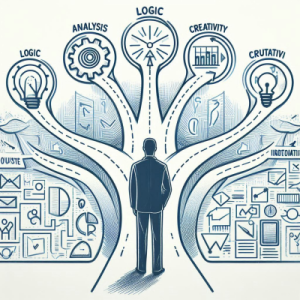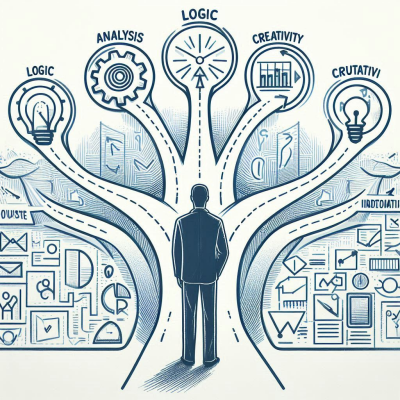You’re always working to improve and refine your critical thinking skills, but have you considered the numerous ways you could take them to the next level? From questioning assumptions to fostering creativity and embracing diverse perspectives, there are key strategies that can greatly enhance your ability to analyze, evaluate, and synthesize information effectively.
Let’s explore these 10 essential techniques that can transform the way you approach problems and decisions, leading you towards a more robust and nuanced thinking process.
Practice Active Listening
 To enhance your critical thinking skills, actively listen to others during discussions and conversations. Reflective listening, which involves giving an attentive response to what others are saying, is a key component of effective communication. By truly hearing and understanding different viewpoints, you can broaden your perspective and challenge your own assumptions.
To enhance your critical thinking skills, actively listen to others during discussions and conversations. Reflective listening, which involves giving an attentive response to what others are saying, is a key component of effective communication. By truly hearing and understanding different viewpoints, you can broaden your perspective and challenge your own assumptions.
Empathetic communication is another important aspect of active listening. To truly engage with others, approach conversations with an open mind and a willingness to empathize with their thoughts and feelings. This not only fosters better relationships but also allows you to see issues from various angles, thereby enhancing your critical thinking abilities.
When you actively listen to others, you demonstrate respect for their opinions and create a more inclusive environment for dialogue. This practice encourages deeper discussions and enables you to explore alternative viewpoints that may lead to more well-rounded conclusions.
Ask Probing Questions
Enhancing your critical thinking skills involves the strategic use of probing inquiries to explore deeper into various perspectives and uncover underlying assumptions. When posing probing questions, it’s crucial to contemplate the significance of exploring different viewpoints. By asking questions that prompt others to share their perspectives, you gain a more inclusive understanding of the topic at hand. This process allows you to analyze underlying motives behind various arguments or positions, enabling you to make informed judgments.
Probing questions serve as a tool to delve into the rationale behind different viewpoints. They help you uncover biases, gaps in logic, or hidden agendas that may not be immediately evident. By actively engaging in this questioning process, you challenge yourself to think critically and ponder alternative explanations.
This analytical approach fosters a more well-rounded perspective and enhances your ability to make sound decisions based on a thorough evaluation of information. So, next time you find yourself in a discussion or evaluating a situation, remember the power of posing probing questions to sharpen your critical thinking skills.
Challenge Assumptions
Challenging assumptions is a fundamental aspect of honing your critical thinking skills, allowing you to dissect underlying beliefs and biases to arrive at more objective conclusions. When you question beliefs, you open yourself up to a world of possibilities beyond what’s traditionally accepted. By exploring biases, you can uncover hidden agendas or preconceived notions that may be clouding your judgment. It’s essential to recognize that assumptions aren’t always based on facts but can stem from personal experiences, societal influences, or even misinformation. By actively challenging these assumptions, you exercise your critical thinking muscles and develop a more discerning mindset.
Research suggests that individuals who regularly challenge assumptions tend to be more open-minded and adaptable to new information. This practice can lead to innovative solutions and a deeper understanding of complex issues. Embracing the discomfort that comes with questioning long-held beliefs can ultimately lead to intellectual growth and a more nuanced perspective on the world around you.
Improve Problem-Solving Skills
Improving problem-solving skills involves developing the ability to analyze situations, identify key issues, and generate effective solutions based on logical reasoning and critical evaluation.
To enhance your problem-solving skills, you can start by brainstorming solutions and exploring alternative approaches to a problem. This process allows you to contemplate different perspectives and think creatively about possible solutions.
Role-playing scenarios can also be a valuable tool in improving problem-solving abilities. By simulating challenges or difficult situations, you can practice making decisions under pressure and develop your ability to think on your feet.
Engaging in activities that require problem-solving, such as puzzles, logic games, or real-life scenarios, can help sharpen your analytical skills and enhance your ability to tackle complex problems efficiently.
Additionally, seeking feedback from others on your problem-solving approaches can provide valuable insights and help you refine your strategies. By consistently practicing and honing your problem-solving skills through diverse methods, you can become more adept at managing challenges and finding effective solutions in various situations.
Engage in Debates
Participating in debates fosters critical thinking skills by encouraging you to analyze different perspectives, construct logical arguments, and defend your opinions with evidence-based reasoning.
Engaging in debates provides a platform to critically evaluate various arguments presented by others. Through this process, you can hone your ability to analyze the validity and soundness of different viewpoints, enhancing your critical thinking skills.
Moreover, actively participating in debates requires you to support your claims with credible evidence and logical reasoning. This practice not only sharpens your analytical skills but also helps you articulate your thoughts more effectively. By providing evidence to back up your arguments, you learn to think critically about the information you present and consider its relevance and reliability.
In essence, debates serve as a valuable tool for enhancing critical thinking skills by challenging you to analyze arguments critically and support your claims with solid evidence. This practice can notably improve your ability to think logically and critically evaluate information from various perspectives.
Enhance Research Abilities
Developing strong research abilities is vital for enhancing your critical thinking skills as it equips you with the necessary tools to analyze information effectively and make informed judgments.
To enhance your research abilities, it’s important to focus on analyzing sources and conducting experiments. When analyzing sources, make sure you evaluate the credibility, relevance, and accuracy of the information presented. This critical evaluation will help you differentiate between reliable sources and those that may contain biases or misinformation, allowing you to make more informed decisions based on trustworthy data.
Additionally, conducting experiments can provide first-hand experience and empirical evidence to support your arguments or conclusions. Designing experiments, collecting data, and interpreting results will sharpen your analytical skills and help you draw logical inferences from the information gathered.
Develop Logical Reasoning
To further enhance your critical thinking skills, cultivating a strong aptitude for logical reasoning is imperative. Logical reasoning involves analyzing arguments and evaluating evidence to make sound judgments.
Here are essential steps to develop your logical reasoning skills:
-
Analyze Arguments: Break down complex arguments into their component parts to understand the underlying logic. Identify premises, conclusions, and the reasoning connecting them.
-
Evaluate Evidence: Scrutinize the quality and relevance of the evidence presented to support an argument. Consider the source, credibility, and biases that may influence the evidence.
-
Draw Inferences: Use logical deductions to draw conclusions from the information provided. Make sure your inferences are supported by the evidence and reasoning presented.
-
Identify Fallacies: Be aware of common logical fallacies that can weaken arguments. Recognizing fallacies helps you spot weaknesses in reasoning and strengthen your own arguments.
Foster Creativity
Cultivating creativity is essential for enhancing critical thinking skills as it enables individuals to approach problems from different perspectives and generate innovative solutions.
To foster creativity effectively, it’s important to engage in activities that encourage brainstorming ideas and collaborating on projects. Brainstorming allows for the generation of diverse solutions to a problem by exploring various possibilities. Collaborating on projects with others brings together different viewpoints and skill sets, leading to more creative and well-thought-out outcomes.
Research has shown that engaging in creative activities not only enhances critical thinking skills but also improves overall cognitive function. By actively seeking out opportunities to brainstorm ideas and collaborate with peers, individuals can expand their thinking processes and develop their problem-solving abilities.
Furthermore, creativity is a skill that can be honed and improved over time through practice and exposure to new experiences. As a result, incorporating activities that foster creativity into your daily routine can greatly enhance your critical thinking skills and overall cognitive abilities.
Embrace Diverse Perspectives
Embracing diverse perspectives is an essential strategy in broadening your critical thinking skills, fostering a more inclusive understanding of complex issues.
Cultural exchanges offer valuable insights into different worldviews, challenging your existing beliefs and expanding your knowledge base.
Open-mindedness allows you to approach problems from various angles, promoting a deeper analysis and consideration of alternative solutions.
Cognitive flexibility enables you to adapt your thinking patterns to different contexts, enhancing your problem-solving abilities and creativity.
Empathy building plays a pivotal role in understanding the emotions and perspectives of others, leading to more effective communication and collaboration.
By actively seeking out diverse perspectives, you not only enrich your own understanding but also contribute to a more inclusive and harmonious society.
Embrace the richness of diverse viewpoints to sharpen your critical thinking skills and cultivate a broader appreciation of the complexities surrounding you.
Reflect on Your Thinking Process
Engage in deliberate self-reflection to evaluate and enhance your cognitive processes, a fundamental step in developing your critical thinking skills. Journal reflection is a powerful tool that allows you to track your thoughts, decisions, and problem-solving strategies. By regularly writing in a journal, you can gain insight into your reasoning patterns, biases, and areas for improvement.
Mindfulness practice complements journal reflection by helping you stay present and focused on the task at hand. Being mindful of your thoughts and emotions enables you to approach problems with clarity and objectivity.
When reflecting on your thinking process, consider questions like: What assumptions did I make? How did my emotions influence my decisions? Were there alternative perspectives I could have considered? By critically analyzing your thinking, you can uncover underlying beliefs or cognitive shortcuts that may impact your judgment.
This awareness opens up opportunities for growth and refinement of your critical thinking abilities. Remember, self-reflection is a continuous practice that requires dedication and commitment to sharpen your cognitive skills.
Conclusion
To sum up, by actively participating in critical thinking practices such as asking probing questions, challenging assumptions, and embracing diverse perspectives, you can enhance your analytical abilities.
Remember to reflect on your thinking process, foster creativity, and develop logical reasoning skills to become a more well-rounded critical thinker.
Continuously seeking out opportunities to improve your problem-solving skills and engaging in debates will further sharpen your critical thinking capabilities.
Keep questioning, analyzing, and learning to unleash your full potential.








